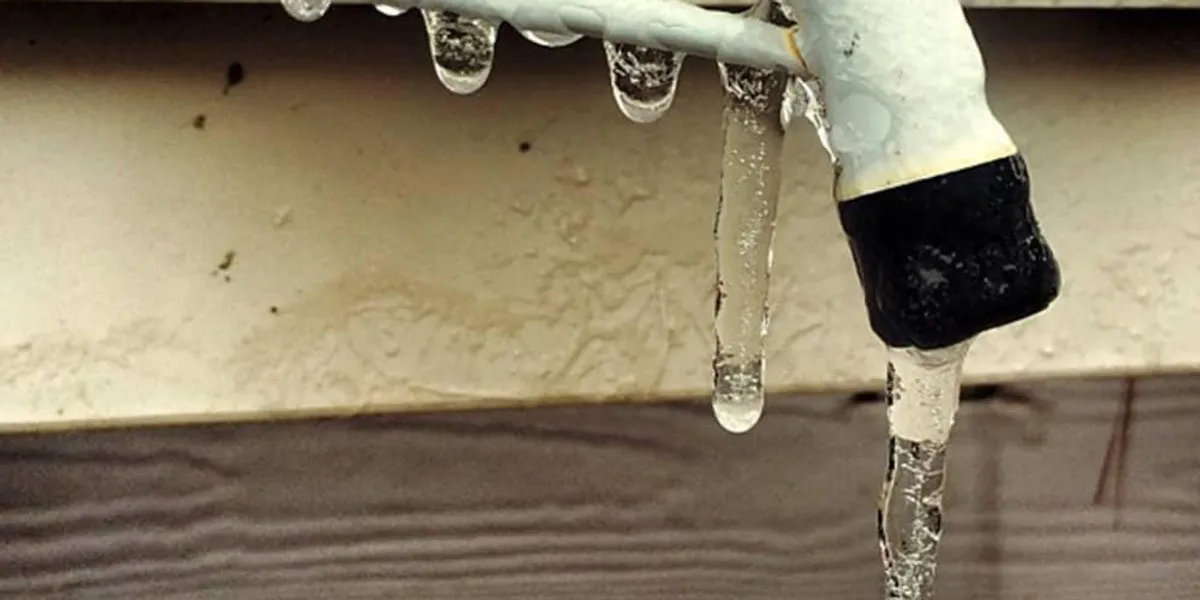How to Protect Pipes from Cold Weather Damage: Important Tips
How to Protect Pipes from Cold Weather Damage: Important Tips
Blog Article
We've uncovered this article involving Helpful Tips to Prevent Frozen Pipes this Winter down the page on the web and thought it made good sense to share it with you on this site.
:strip_icc()/snow-outdoor-faucet-pipes-4af65d1e5e904fb1aa7bf74071fe5d89.jpg)
Winter can ruin your plumbing, especially by freezing pipelines. Here's just how to prevent it from occurring and what to do if it does.
Intro
As temperatures drop, the danger of icy pipes rises, potentially resulting in pricey repair services and water damage. Recognizing exactly how to prevent icy pipes is essential for house owners in cool climates.
Prevention Tips
Shielding vulnerable pipes
Cover pipes in insulation sleeves or utilize warmth tape to shield them from freezing temperatures. Concentrate on pipes in unheated or external areas of the home.
Heating methods
Keep interior rooms appropriately warmed, especially locations with plumbing. Open closet doors to enable warm air to distribute around pipelines under sinks.
Exactly how to determine frozen pipes
Search for decreased water flow from faucets, unusual odors or noises from pipelines, and visible frost on revealed pipelines.
Long-Term Solutions
Structural adjustments
Consider rerouting pipes away from exterior wall surfaces or unheated locations. Add additional insulation to attics, cellars, and crawl spaces.
Updating insulation
Purchase top quality insulation for pipelines, attics, and wall surfaces. Correct insulation aids maintain consistent temperature levels and reduces the threat of frozen pipelines.
Shielding Exterior Plumbing
Yard tubes and outdoor taps
Disconnect and drain yard pipes prior to winter season. Set up frost-proof faucets or cover outside taps with insulated caps.
Recognizing Frozen Pipes
What causes pipes to freeze?
Pipelines freeze when exposed to temperature levels listed below 32 ° F (0 ° C) for expanded durations. As water inside the pipelines freezes, it broadens, taxing the pipe wall surfaces and potentially triggering them to break.
Dangers and problems
Frozen pipes can cause water disruptions, building damage, and expensive fixings. Burst pipes can flood homes and trigger extensive structural damage.
Indicators of Frozen Piping
Determining frozen pipelines early can stop them from breaking.
What to Do If Your Pipelines Freeze
Immediate actions to take
If you think frozen pipes, maintain faucets open to ease stress as the ice melts. Make use of a hairdryer or towels taken in hot water to thaw pipes gradually.
Conclusion
Avoiding icy pipelines needs aggressive actions and fast feedbacks. By comprehending the causes, indications, and safety nets, homeowners can safeguard their plumbing during cold weather.
Helpful Tips to Prevent Frozen Pipes this Winter
UNDERSTANDING THE BASICS: WHY PIPES FREEZE AND WHY IT’S A PROBLEM
Water freezing inside pipes is common during the winter months, but understanding why pipes freeze, and the potential problems it can cause is crucial in preventing such incidents. This section will delve into the basics of why pipes freeze and the associated problems that may arise.
THE SCIENCE BEHIND FROZEN PIPES
When water reaches freezing temperatures, it undergoes a physical transformation and solidifies into ice. This expansion of water as it freezes is the primary reason pipes can burst. As the water inside the pipe freezes, it expands, creating immense pressure on the walls. If the pressure becomes too great, the pipe can crack or rupture, leading to leaks and water damage.
FACTORS THAT CONTRIBUTE TO PIPE FREEZING
Low Temperatures: Extremely cold weather, especially below freezing, increases the risk of pipes freezing. Uninsulated or Poorly Insulated Pipes: Pipes located in unheated areas, such as basements, crawl spaces, or attics, are more prone to freezing. Insufficient insulation or lack of insulation altogether exacerbates the problem. Exterior Wall Exposure: Pipes running along exterior walls are susceptible to freezing as they encounter colder temperatures outside. Lack of Heating or Temperature Regulation: Inadequate heating or inconsistent temperature control in your home can contribute to frozen pipes. PROBLEMS CAUSED BY FROZEN PIPES
- Pipe Bursting: As mentioned earlier, the expansion of water as it freezes can cause pipes to burst, resulting in significant water damage.
- Water Damage: When pipes burst, it can lead to flooding and water damage to your property, including walls, ceilings, flooring, and personal belongings.
- Structural Damage: Prolonged exposure to water from burst pipes can compromise the structural integrity of your home, leading to costly repairs.
- Mold and Mildew Growth: Excess moisture from water damage can create a favorable environment for mold and mildew growth, posing health risks to occupants.
- Disrupted Water Supply: Frozen pipes can also result in a complete or partial loss of water supply until the issue is resolved.
WHY CERTAIN PIPES ARE MORE PRONE TO FREEZING
- Location: Pipes located in unheated or poorly insulated areas, such as basements, crawl spaces, attics, or exterior walls, are at higher risk of freezing.
- Exterior Pipes: Outdoor pipes, such as those used for irrigation or exposed plumbing, are particularly vulnerable to freezing as they are directly exposed to the elements.
- Supply Lines: Pipes that carry water from the main water supply into your home, including the main water line, are critical to protect as freezing in these lines can affect your entire plumbing system.
- Underground Pipes: Pipes buried underground, such as those connected to sprinkler systems or outdoor faucets, can be susceptible to freezing if not properly insulated.
https://busybusy.com/blog/helpful-tips-to-prevent-frozen-pipes-this-winter/

As a keen reader on 6 Ways to Prevent Frozen Pipes, I think sharing that excerpt was worth the trouble. Do you know about somebody who is very much interested in the niche? Be sure promote it. Thanks so much for going through it.
Book Now Report this page